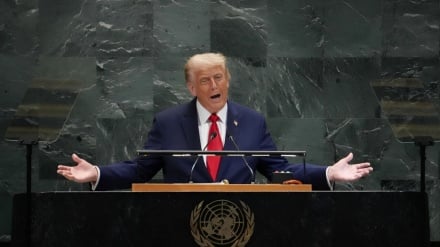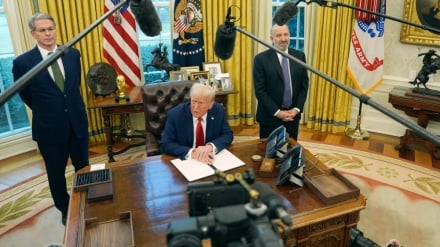Why has American democracy faded in the face of Israel’s interests?
-

Protesters opposing Microsoft’s cooperation with the Zionist regime have been arrested.
Pars Today – U.S. police have arrested protesters opposing Microsoft’s cooperation with the Zionist regime.
Sources within Unit 8200 of the Israeli army have revealed that data from Microsoft’s Azure cloud platform has been used by the regime as a vast information base on residents of the West Bank. According to Pars Today, these sources stated that the information has been employed for purposes such as blackmailing individuals, detaining them, or justifying their killing. It has also been reported that this data has played a significant role in planning the regime’s military attacks on Gaza and the West Bank.
These revelations have once again heightened concerns about the Israeli regime’s instrumental use of Western technologies to suppress and control the Palestinian people. Meanwhile, the arrest of a group of protesters in the United States over Microsoft’s cooperation with the regime has once again raised the question of where American democracy and its claimed individual and social freedoms truly stand — and why they fade when confronted with Israel’s interests. A country that presents itself as the cradle of free speech and accuses others of human rights violations — why does it respond in this manner to the peaceful protests of its own citizens?
The arrest of protesters opposing Microsoft’s cooperation with the Zionist regime is merely the latest example illustrating where the boundaries of freedom in the United States truly lie — and how quickly those boundaries collapse once they intersect with Israel. What apparently took place was a protest gathering, followed by the arrest of demonstrators. Yet this reaction clearly demonstrates that in Washington’s hierarchy of values, the security and interests of Israel are placed above the rights of American citizens.
This behavior is rooted in the long history of the United States’ unconditional support for Israel. Since 1948, Washington has provided the regime with billions of dollars in military and economic aid, repeatedly used its veto power in the UN Security Council to block critical resolutions against Israel, and consistently defended Tel Aviv’s policies on the political stage. In recent months, for instance, the crackdown on widespread student protests at prestigious American universities has led to the expulsion, arrest, and intimidation of protesting students.
In fact, in recent months, instead of serving as centers for free dialogue, universities have turned into arenas for suppressing academic freedom. These actions clearly show that in the United States, freedom of speech is selective — you are free to speak only as long as your words do not conflict with Israel’s interests.
This contradiction comes at a time when the United States has, for decades, sought to use the image of being a defender of freedom as a tool of its soft power. Yet when anti-war protesters are suppressed in the streets of New York or on the campuses of Harvard and Columbia, or when employees are arrested simply for protesting inside a technology company’s office, it becomes impossible to speak of the so-called entrenched democracy that America claims to embody.
On the other hand, the instrumental use of Western technologies for Israel’s military purposes raises serious ethical questions. Companies such as Microsoft and Google have repeatedly faced accusations of indirect cooperation in Israeli military projects. When it becomes clear that user data on cloud platforms may end up in the hands of an army that uses it to plan attacks or carry out arbitrary detentions, the issue extends far beyond foreign policy — it strikes at public trust in technology and even the very notion of accountability for multinational corporations. Microsoft’s response, claiming ignorance of the type of data used by Israel, is therefore hardly justifiable in this context.
In reality, what is unfolding in the United States is a performance of democracy — whenever Israel’s interests are at stake, the proclaimed principles of commitment to democracy and free expression are easily set aside. At the same time, such actions further expose Washington’s double, and at times multiple, standards: a country that imposes sanctions on others for human rights violations, yet remains silent in the face of blatant violations by its closest ally — or even suppresses its own domestic protesters — how can such a country credibly claim to uphold democracy at home?
The arrest of Microsoft employees and the suppression of students are only examples of a broader trend — one in which Israel has become a fundamental priority in U.S. domestic and foreign policy, overshadowing every other value. In this light, America must be seen as a power whose principles collapse easily in the face of regional policies and the pressure of Zionist lobbies. What is clearly unfolding is that “American democracy,” in the face of Israel’s interests, has not only faded but has been reduced to an empty performance.


